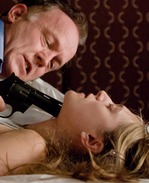SITE GUIDE
SEARCH
REVIEWS
REVIEW ARCHIVES
ADVERTISING AT CURTAINUP
FEATURES
NEWS
Etcetera and
Short Term Listings
LISTINGS
Broadway
Off-Broadway
NYC Restaurants
BOOKS and CDs
OTHER PLACES
Berkshires
London
California
New Jersey
Philadelphia
Elsewhere
QUOTES
TKTS
PLAYWRIGHTS' ALBUMS
LETTERS TO EDITOR
FILM
LINKS
MISCELLANEOUS
Free Updates
Masthead
A CurtainUp Review
Blasted
|
The world don't exist, not like this.
Looks the same but-.—--Cate
|

Reed Birney (as Ian) and Marin Ireland (as Cate) & in Blasted
(Photo: Carol Rosegg)
|
Blasted is the story of Ian and Cate, holed up in an upscale hotel room. They have some sexual history together, though we never quite learn more of the backstory than that Ian is desperate to reconnect with the much younger and a bit mentally challenged Cate. The first part of the play is a long, drawn-out sexual assault, with Ian alternately smug in his ability to manipulate Cate and angry at her indifference to him. Then an armed soldier with an unplaceable foreign accent breaks into the room and begins his own assault, on Ian.
An enormous explosion turns the hotel room, and the lives of the characters, inside out. Time, space and even language condense. It's as if the explosion has turned reality inside out, as well.
The faint of heart should be forewarned that rape, oral sex, cannibalism, defecation, and suicide are all part of the onstage action. In what might be an unintentional paean to the eyeball-plucking scene in King Lear there's also a scene in which the soldier eats Ian's eyeballs out of his skull.
Though all this might give the impression that the violence in Blasted is gratuitous, it isn't. The fact that it's s hard to watch is exactly the point—violence and rape should be hard to watch. The play points out not only our own desensitivity to violence but the parallels between sexual assault and the atrocities of war.
This production is Blasted's long delayed New York premiere. When the play by the 24-year-old Sarah Kane debuted in London in 1995 (four years before she committed suicide), it sparked an enormous controversy and was widely vilified. Most critics have since reversed their original opinions and Kane is now regarded as one of Britain's most important modern writers. Thus this long delayed New York premiere of Blasted is something of an event. (Its limited run has already been extended by a week, and it would not be surprising if it wereextended again).
Part of the play's lingering aftertaste is because it's impossible to identify with any of the characters. Ian is an unredeemable jerk, who sees nothing wrong with raping Cate at gunpoint while she's passed out, boasting of his killer instincts and imperviousness to pain, and mocking her physical pain the next day. Cate, though simple, is incapable of standing up for herself or seeing Ian for what he really is. The soldier is merciless, but also astonishingly cogent, and is perhaps the most emotionally true character in the play. That said, these characters attempt over and over again to strike some small spark of connection with other.
Thanks to director Sarah Benson, the persistent search for connection comes through even in the last Beckettian moments and the three actors makes highlighting those attempts to connect a priority. Reed Birney as Ian is desperate, almost pitiable, at times, as he alternately lashes out and beseeches Cate for some small token of affection. Marin Ireland last seen in The Beebo Brinker Chronicles has Cate find the meager shreds of humanity in those around her, and uses those shreds as a shield against the horrors of the world. Even after Cate prostitutes herself for some scraps of food, Ireland makes her seem untouched and still a little innocent. Louis Cancelmi (last season's Philoktetes at SoHo Rep) is riveting in his brief appearance as the soldier. His bout of coital sobbing is more brutal than the rape itself. His general nonchalance and detachment toward war's obligatory torture and rape makes a weird sort of sense, far more so than Ian's insistence that he "couldn't do such a thing" in the face of his earlier rape-at-gunpoint of Cate. Cancelmi's wide-eyed, blank face says much about the mental trauma of such disconnection from his actions.
Set designer Louisa Thompson does a fantastic job of rendering the generic hotel room setting into an apocalyptic post-explosion mélange of debris. The explosion itself, with its blinding flash of light and an extended heavy rumble of bass, deeply unsettling. The bass reverberates inside your head for several moments, literally rattling the seats. The eerie flash of light (courtesy lighting designer Tyler Micoleau) is reminiscent of lighting designer Tyler Micoleau's Obie award winning use of light in Tracy Letts' Bug ). Both explosions (Bug and Blasted) remain the most memorable use of lighting effects I've ever seen.
Kane's work is simultaneously expressionist and Jacobean, and poetically intense. Have a drink to brace yourself before seeing Blasted , but see it.
|
Blasted Written by Sarah Kane Directed by Sarah Benson With: Reed Birney (Ian), Marin Ireland (Cate) and Louis Cancelmi (Soldier) Set Designer: Louisa Thompson Lighting Designer: Tyler Micoleau Sound Designer: Matt Tierney Costume Designer: Theresa Squire Running Time: 90 minutes with no intermission SoHo Rep, 46 Walker Street, 212-352-3101 From 10/02/08; opening 10/09/08; closing 11/09/08—extended to 12/21/08. Tuesday through Sunday at 7:30 pm Tickets $.99 through $30 Reviewed by Jenny Sandman based on October 8th performance |
|
REVIEW FEEDBACK Highlight one of the responses below and click "copy" or"CTRL+C"
Paste the highlighted text into the subject line (CTRL+ V): Feel free to add detailed comments in the body of the email. |






